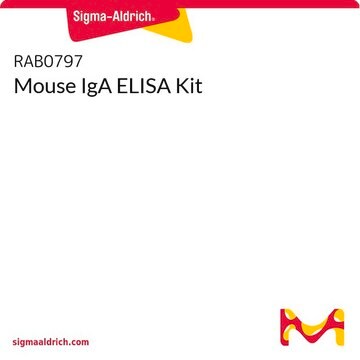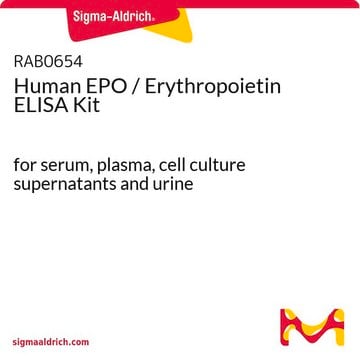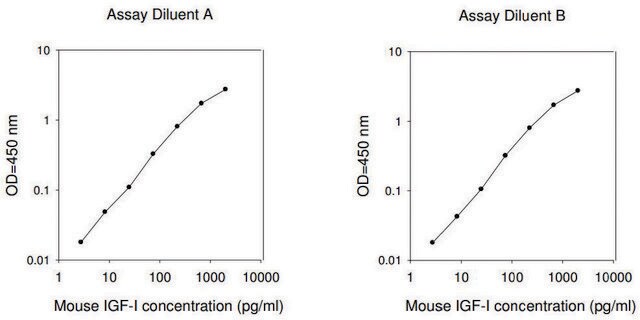RAB0802
Mouse IgG1 ELISA Kit
Synonym(s):
IgG1, Immunoglobulin G1
Sign Into View Organizational & Contract Pricing
All Photos(1)
About This Item
UNSPSC Code:
41116158
NACRES:
NA.32
Recommended Products
species reactivity
mouse
technique(s)
ELISA: suitable
assay range
inter-assay cv: <10%
intra-assay cv: <12%
shipped in
wet ice
storage temp.
−20°C
General description
Immunoglobulin G (IgG) is the most prevalent protein found in the human serum. About 10–20% of plasma protein accounts for IgG. IgG1 is the major Ig isotype in murine serum. It resembles human IgG4 functionally. Murine immunoglobulin G1 (IgG1) is capable of blocking the complex formation of IgG2a, IgG2b, and IgG3 with C1q. C1q-mediated complement activation by IgG2a can be blocked by murine IgG1. Because of their likely inhibitory influence on both complement and classical Fcγ receptor (FcγR) activation, murine IgG1 may have the greatest inhibitory capacity toward all other IgG types. The antibody pair provided in this kit recognizes mouse IgG1.
Application
For research use only. Not for use in diagnostic procedures.
Please refer to the attached General ELISA KIT Procedure (sandwich, competitive & Indirect ELISA)
Please refer to the attached General ELISA KIT Procedure (sandwich, competitive & Indirect ELISA)
Signal Word
Warning
Hazard Statements
Precautionary Statements
Hazard Classifications
Met. Corr. 1
Storage Class Code
8A - Combustible corrosive hazardous materials
Flash Point(F)
Not applicable
Flash Point(C)
Not applicable
Certificates of Analysis (COA)
Search for Certificates of Analysis (COA) by entering the products Lot/Batch Number. Lot and Batch Numbers can be found on a product’s label following the words ‘Lot’ or ‘Batch’.
Already Own This Product?
Find documentation for the products that you have recently purchased in the Document Library.
Customers Also Viewed
Gina-Maria Lilienthal et al.
Frontiers in immunology, 9, 958-958 (2018-06-06)
IgG antibodies (Abs) mediate their effector functions through the interaction with Fcγ receptors (FcγRs) and the complement factors. The main IgG-mediated complement activation pathway is induced through the binding of complement C1q to IgG Abs. This interaction is dependent on
Roxanne Collin et al.
Journal of immunology (Baltimore, Md. : 1950), 193(7), 3503-3512 (2014-08-29)
Autoimmune diseases result from a break in immune tolerance. Various mechanisms of peripheral tolerance can protect against autoimmunity, including immunoregulatory CD4(-)CD8(-) double-negative (DN) T cells. Indeed, we have previously shown that diabetes-prone mouse strains exhibit a low proportion of DN
Richard T Strait et al.
Nature, 517(7535), 501-504 (2014-11-05)
Immunoglobulins protect against disease to a considerable extent by activating complement and stimulatory immunoglobulin crystallizable fragment receptors (Ig FcRs), and aggregating microbial pathogens. Yet IgG1, the predominant murine serum Ig isotype, cannot activate complement by the classical pathway, binds more
Arjan van der Flier et al.
PloS one, 10(4), e0124930-e0124930 (2015-04-24)
We recently developed a longer lasting recombinant factor VIII-Fc fusion protein, rFVIIIFc, to extend the half-life of replacement FVIII for the treatment of people with hemophilia A. In order to elucidate the biological mechanism for the elongated half-life of rFVIIIFc
Chanjuan Shen et al.
Vaccine, 32(41), 5337-5342 (2014-08-06)
A better understanding of immune responses in human infants could lead to more effective immunization and vaccination strategies in early life. Since antibodies are key components of protective vaccine responses, we examined developmental changes in serum levels of immunoglobulins (IgG
Our team of scientists has experience in all areas of research including Life Science, Material Science, Chemical Synthesis, Chromatography, Analytical and many others.
Contact Technical Service
